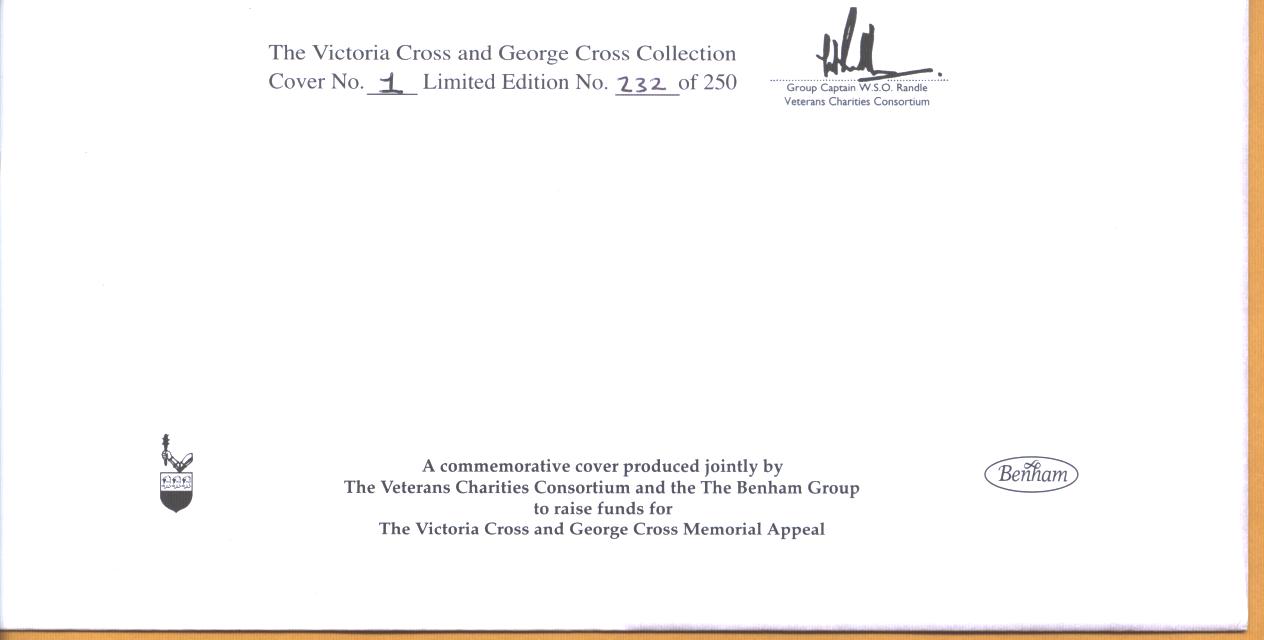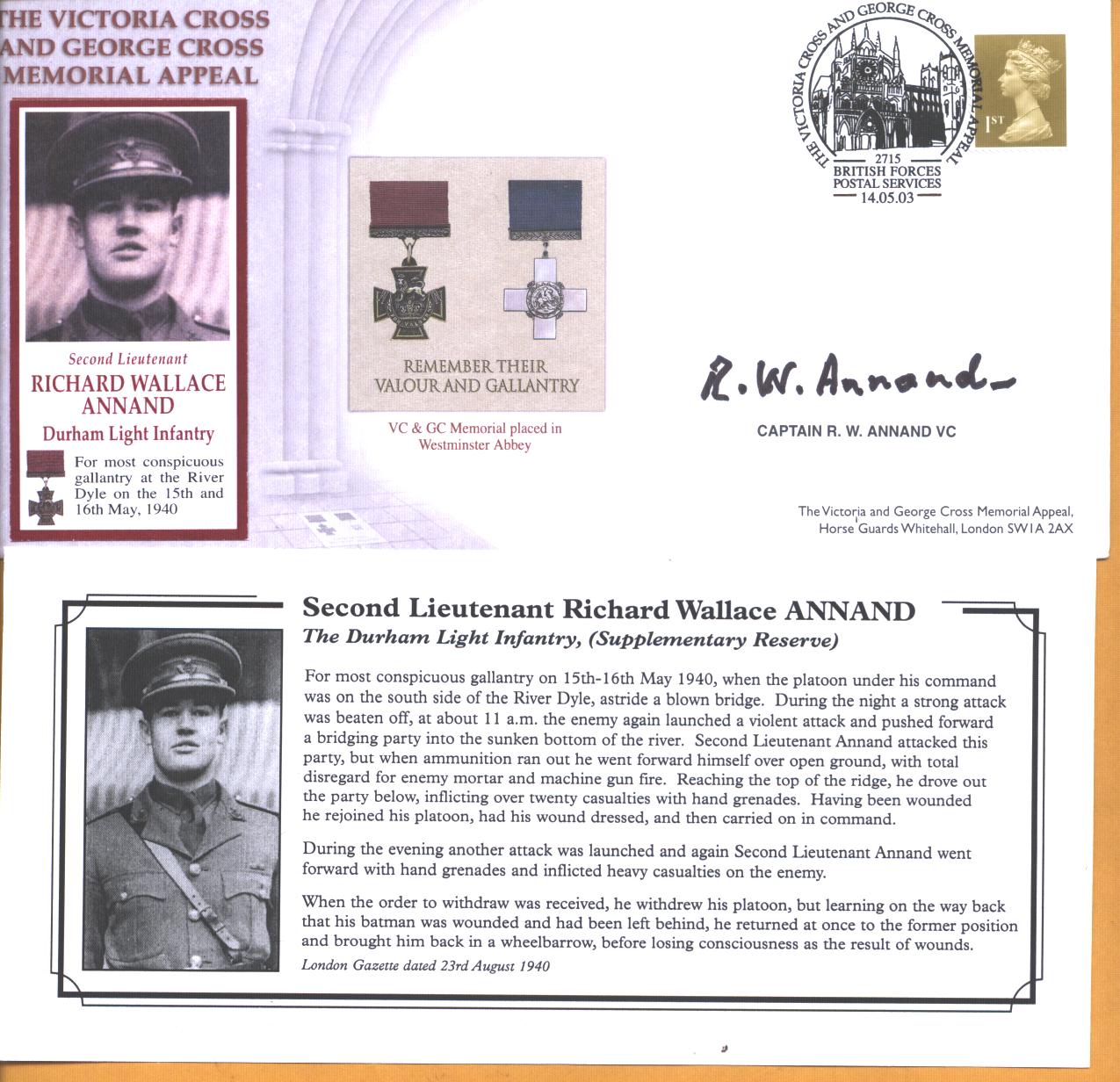

|
ANNAND Richard
THE DEATH HAS BEEN ANNOUNCED OF CAPTAIN RICHARD ANNAND VC, 2ND BN, THE DURHAM LIGHT INFANTRY. THE ARMY'S FIRST VC OF WW II
28 December 2004
Captain Richard Annand, who died on the 24th December 2004, aged 90, won the Army's first Victoria Cross of the Second World War when serving with the 2nd Battalion, The Durham Light Infantry.
Belgian neutrality in the early months of the war left the British Expeditionary Force and the Franch Army with an open flank from the northern end of the Maginot Line to the Channel coast. But, forwarned of a German attack through the Low Countries by a Wehrmacht plan which had fallen into Belgian hands and been handed over to the French, the Allied armies were ready to cross the frontier and occupy a defensive line along the River Dyle, east of Brussels, as soon as Belgian neutrality was breached. Germany launched her attack on 10th May 1940.
Annand was a platoon commander with 2nd Battalion, The Durham Light Infantry in the 2nd Division sent to man positions on the Dyle, near the village of La Tombe. The ground on the west bank could hardly have been less suitable; trees and undergrowth made observation of the approaches to the opposite bank difficult and, to the rear, open ground rose steeply to the village. Annand was with D Company covering the road bridge over the Dyle, across which another company of the Durhams had been forced to withdraw before the advancing German army on the afternoon of 14th May, when the bridge was blown.
At 11.00 the next day the enemy launched a violent attack to cover the move of a bridging party into the sunken riverbed. Annand led a group of men from his platoon in a counter-attack and, when their small-arms ammunition was exhausted, went forward alone to throw grenades from the edge of the ruined bridge on to the enemy bridging party working below, inflicting some 20 casualties. The enemy was thus prevented from crossing the river in continued fighting, but the situation remained grave, and the company commander had been badly wounded. During the evening of the same day, the enemy launched another attack under cover of intense mortar and machine-gun fire. Annand again went forward armed with all the grenades he could carry and attacked the German troops attempting to repair the bridge.
But elsewhere the Allied line had broken and at 23.00 the Durhams commanding officer gave the order to withdraw as part of the general move back to the line of the River Scheldt. As Annand led the survivors of his platton away from the bridge in the early hours of 16th May, he discovered that his batman, Private Joseph Hunter, from Sunderland, had been wounded in the head and legs and was unable to walk. Despite his own wounds sustained in the day's fighting, he found a wheelbarrow, lifted Hunter into it and wheeled him to the rear until their way was barred by a fallen tree. Leaving Hunter in an empty trench he set out to find help but collapsed from exhaustion and loss of blood shortly after finding his company HQ position abandoned. Hunter was captured by the advancing Germans and sent to a Dutch hospital, but died of his wounds a month later.
Five British soldiers won the Victoria Cross between 15th May and 1st June 1940. Richard Annand's was the first.
[ London Gazette, 23 August 1940 ], River Dyle, Belgium, 15 - 16 May 1940, Second Lieutenant Richard Wallace Annand, 2nd Bn, The Durham Light Infantry.
For most conspicuous gallantry on the 15th-16th May 1940, when the platoon under his command was on the south side of the River Dyle, astride a blown bridge. During the night a strong attack was beaten off, but about 11 a.m. the enemy again launched a violent attack and pushed forward a bridging party into the sunken bottom of the river. Second Lieutenant Annand attacked this party, but when ammunition ran out he went forward himself over open ground, with total disregard for enemy mortar and machine-gun fire. Reaching the top of the bridge, he drove out the party below, inflicting over twenty casualties with hand grenades. Having been wounded he rejoined his platoon, had his wound dressed, and then carried on in command.
Richard Annand's platoon sergeant said later "Mr Annand came to me at platoon headquarters and asked for a box of grenades as they could hear Jerry trying to repair the bridge. Off he went and he sure must have given them a lovely time because it wasn't a great while before he was back for more".
During the evening another attack was launched and again Second Lieutenant Annand went forward with hand grenades and inflicted heavy casualties on the enemy. When the order to withdraw was received, he withdrew his platoon, but learning on the way back that his batman was wounded and had been left behind, he returned at once to the former position and brought him back in a wheelbarrow, before losing consciousness as the result of wounds.
Following the withdrawl Annand was jolted through France in a Belgian hospital train without food or water. He no sooner arrived at the hospital in Calais than it had to be evacuated. He was put aboard the first of two hospital ships, the second was bombed and sunk.
As a result of wounds received in the action in Belgium in May 1940, Annand was invalided back to England but rejoined the re-formed 2nd Battalion at Bridlington the following month. However, in June 1941, as a result of rifle practice on the ranges, Richard Annand lost what remained of his hearing and was discharged from the Battalion. He spent the rest of the war in several army posts in such diverse places as Inverness-shire, the Cairngorms and London. Although offered a commission in the Pay Corps, he declined, and in 1948 he was invalided out of the Army.
Signed postal cover for the Victoria Cross and George Cross Memorial Appeal
Price: $40.00
Please contact us before ordering to confirm availability and shipping costs.
Buy now with your credit card
other ways to buy
|


